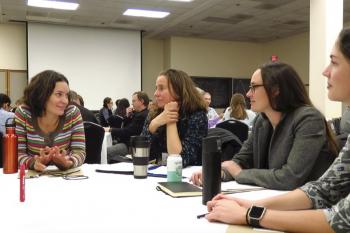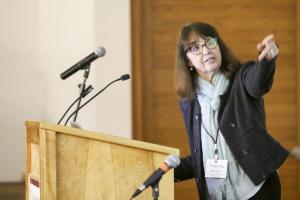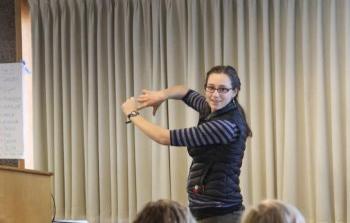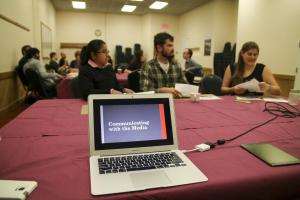First Ever National Climate Science Center Student and Early Career Training
This piece is contributed by Andrew C. Battles, a PhD candidate at the University of Rhode Island studying evolutionary and urban ecology, and is currently an intern at NCCWSC as part of the NSF graduate research fellowship program. He wrote this blog for the Early Career and Climate Forum.
Last week, I attended the National CSC Student and Early Career Training held at the University of Massachusetts Amherst, and left feeling inspired, empowered, and with many new friends. From November 2-3rd, students, postdocs, and professionals from the Department of the Interior’s National Climate Science Centers came together to share research, learn from one another, and improve our skills as collaborators and science communicators. While the CSCs have been around since 2010, this was the first time that student and early career researchers from all 8 regions and the National Climate Change and Wildlife Science Center (NCCWSC) at USGS Headquarters have convened. We presented our network’s research and tools as well as heard from top-notch keynote speakers, with continuous opportunities throughout the meeting to network and connect with carefully chosen mentors.
Here’s my top 4 list of take-aways from the training:
1. Life-long Connections
 Group discussion during one coproduction breakout. Photo: Toni Klemm
Group discussion during one coproduction breakout. Photo: Toni KlemmA key theme of the training was the importance of building relationships for both scientific collaboration and career development, and we got to apply that advice right away. The moment I walked into the opening reception, I was shaking hands, learning about cool research and interesting peer experiences. Prior to the meeting, all the early career participants were matched with a CSC mentor with related research interests. I also met many fellow students as well as meeting facilitators, and even had a great conversation that I am confident could launch a new collaboration! These relationships (and friendships!) will hopefully continue throughout our careers. Who knew I would meet people from Guam, Hawaii, and Alaska in the middle of Massachusetts?!
2. Inspiring Keynotes
 Keynote Speaker Virginia Burkett. Photo: Toni Klemm
Keynote Speaker Virginia Burkett. Photo: Toni KlemmWe were fortunate to hear from leaders in the field of climate science and science communication. Allison Meadow, a Staff Scientist at the University of Arizona’s Center for Climate Adaptation Science and Solutions, showed us examples and offered suggestions for creating beneficial co-produced science. Ezra Markowitz, an Assistant Professor of Environmental Conservation at UMass, Amherst, gave a very informative talk on the politics and polarization around climate change, and how we can successfully navigate the territory between climate change facts and people’s values and beliefs. Virginia Burkett, Chief Scientist for Climate and Land Use Change at the USGS, provided insight on communicating climate science and gave advice on needed skills to cultivate successful careers.
3. Fast and Furious Student Presentations
 People’s choice winner for best speed talk and best makeshift map of Alaska, Lindsey Parkinson, giving her talk on, ‘Berry productivity in response to fire in northern and interior Alaska’ Photo: Toni Klemm
People’s choice winner for best speed talk and best makeshift map of Alaska, Lindsey Parkinson, giving her talk on, ‘Berry productivity in response to fire in northern and interior Alaska’ Photo: Toni KlemmCSC students and postdocs presented research projects to each other and CSC-network experts in a “lightning talk” format of 3-minutes each; there were also short demonstrations of research posters and tools. Some of the speed talks were quite creative, and proved that your research can be compellingly conveyed in a short amount of time. In honor of the election year, official and unofficial (the popular vote) votes were cast for the presentations. For the official vote, top winners included Jenell Larson who received first place honors for her speed talk, “Reading ovaries: Broadening our understanding of responses to environmental changes.’; Katie Renwick, for her poster presentation on, “How will climate change affect sagebrush?’ and Makaela Heming for her tools demonstration of the ‘Massachusetts Wildlife Climate Action Tool’. A full list of the winners including the people’s choice recipients can be viewed at the end of the blog.
4. Workshop Sessions
 Student and early careers take part in one of the breakout activities focused on communicating with the media. Photo: Toni Klemm
Student and early careers take part in one of the breakout activities focused on communicating with the media. Photo: Toni KlemmScattered between keynote speakers and speed talks were a range of science and career-focused sessions (e.g., Co-production of Knowledge, and Communicating Climate Science) that included expert panel discussions and interactive break-out activities. I attended the break-outs on Decision Support and Planning Under Uncertainty, but had to unfortunately, miss out on activities focused on Building Relationships with Tribes and Developing (one’s own) Research Agenda. If only there was more time (or there were two of me)! Luckily everyone, especially the career professionals at the training, were approachable and willing to offer help and advice as our time with the CSC community continues.
I’m sure the first national CSC meeting had nothing to do with the first Chicago Cub’s World Series win in a century, but I bet Cubs fans (and this early career climate scientist) can’t wait for the next one!